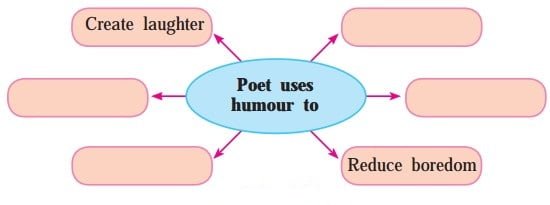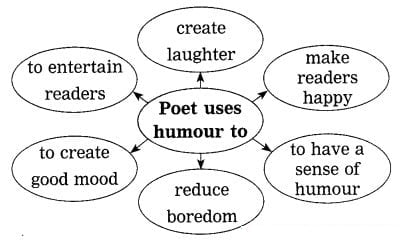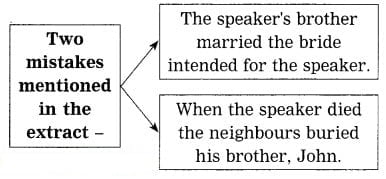Chapter 2.3 The Twins
Textbook Questions and Answers
Warming up!
Chit-chat:
1. Two babies born at the same time are called twins. Guess and share who are :
- triplets
- quadraplets
- quintiplets
Question 1.
Two babies born at the same time are called twins. Guess and share who are :
Answer:
- Three babies born at the same time to the same mother are called triplets.
- Four babies born at the same time to the same mother are called quadruplets.
- Five babies born at the same time to the same mother are called quintuplets.
2. Imagine you liad an identical twin (brother or sisiter). Imagine and share with your classmates what pranks you two would play on your friends, elders in the family and even in school.
Question 1.
Imagine you liad an identical twin (brother or sisiter). Imagine and share with your classmates what pranks you two would play on your friends, elders in the family and even in school.
Answer:
Points: At home : Blame your twin brother for the wrongs/breakage/damage done by you – eat his sweets/sweetmeats and demand it again as the other one – if one did some thing special good, the other pretends as it is done by him – In school: One makes mischief in the class and points his finger at the other, he is guilty of doing something wrong throws blame on the other.
1. Study the following pairs or groups of words. Cup and saucer/needle and thread/birds and beasts/take a risk/sip tea or coffee/hide and seek etc.
These are sets of words that more than often go together and occur together. We call such sets Collocation.
Insert the proper words from the bracket to form collocations.
(a) afford (b) time (c) defeat (d) clothes (e) owners (f) necessary (g) role (h) interview (i) morning (j) cold
(a) absolutely ……………
(b) cannot ………………
(c) formal ……………..
(d) job ……………….
(e) pass ………………
(f) accept …………….
(g) early ………………
(h) catch a …………….
(i) leading ……………..
(j) joint ………………..
Question 1.
Insert the proper words from the bracket to form collocations.
[(a) afford, (b) time, (c) defeat, (d) clothes, (e) owners, (f) necessary, (g) role, (h) interview, (i) morning, (j) cold.]
Answer:
(a) absolutely necessary
(b) cannot afford
(c) formal clothes
(d) job interview
(e) pass time
(f) accept defeat
(g) early morning
(h) catch a cold
(î) leading role
(j) joint owners
2. Exaggeration or overstatement often causes humour. For example, She is thin as a pin.
- He has a pea-sized brain
- My shoes are killthg me.
When such exaggerated lines occur in poetry, they are examples of the Figure of Speech: Hyperbole.
Complete the following examples of Hyperbole using words from the bracket below.
(a) She wept …………………… of tears.
(b) The hungry man ate a …………………… of food.
(c) He runs faster than a ……………………
(d) Brrrr..! I am freezing to ……………………
(e) I shall come over in just a ……………………
(horse/lion/death/an ocean/ton/second/help)
Question 1.
Complete the following examples of Hyperbole using words from the bracket below.
(a) She wept …………………… of tears.
(b) The hungry man ate a …………………… of food.
(c) He runs faster than a ……………………
(d) Brrrr..! I am freezing to ……………………
(e) I shall come over in just a ……………………
(horse/lion/death/an ocean/ton/second/help)
Answer:
(a) She wept an ocean of tears.
(b) The hungry man ate a ton of food.
(c) He runs faster than a horse.
(d) Brrrr..! I am freezing to death.
(e) I shall come over in just a second.
English Workshop:
1. Rewrite putting the mistakes in the speaker’s life, in their proper order.
(a) The speaker got beaten-up, often, at school.
(b) The speaker’s bride became his brother’s wife.
(c) The speaker desparately asked for guidance.
(d) No one in the family could distinguish between the twin – babies.
(e) At the naming ceremony wrong names were given to the two twin brothers.
(f) Even in death, the twins were not spared during burial.
Question 1.
Rewrite putting the mistakes in the speaker’s life, in their proper order.
(a) The speaker got beaten-up, often, at school.
(b) The speaker’s bride became his brother’s wife.
(c) The speaker desparately asked for guidance.
(d) No one in the family could distinguish between the twin – babies.
(e) At the naming ceremony wrong names were given to the two twin brothers.
(f) Even in death, the twins were not spared during burial.
Answer:
(a) No one in the family could distinguish between the twin-babies.
(b) At the naming ceremony wrong names were given to the twin brothers.
(c) He (the narrator) got beaten-up, often, at school.
(d) The speaker desperately asked for guidance.
(e) The speaker’s bride became his brother’s wife.
(f) Even in death, the twins were not spared during burial.
2. Pick out four situations in the lives of the twins, which are too absurd and senseless to believe.
1. ………………..
2. ………………..
3. ………………..
4. ………………..
Question 1.
Pick out four situations in the lives of the twins, which are too absurd and senseless to believe.
Answer:
- The people began mistaking one for the other.
- The speaker’s brother got the name John, intended for the speaker.
- The speaker’s intended bride became his brother’s wife.
- When the speaker died, the neighbours came and buried his brother John.
3. (A) Complete the web diagram.
(B) Write any two lines from the poem, that you find most humorous.
Question a.
Complete the web diagram.

Answer:

Question b.
Write any two lines from the poem, that you find most humorous.
Answer:
1. For somehow, my intended bride Became my brother’s wife.
2. When I died, the neighbours came And buried brother John.
4. Pick out lines that contain :
Alliteration
(a) ………………………………
(b) ………………………………
(c) ………………………………
Pun
(a) ………………………………
(b) ………………………………
Hyperbole
(a) ………………………………
(b) ………………………………
Question 1.
Pick out lines that contain
Answer:
Alliteration:
(a) In form and feature, face and limb.
(b) It puzzled all our kith and kin.
(c) One day, to make the matter worse.
Pun:
(a) I grew so like my brother.
(b) That folks got taking me for him.
Hyperbole:
(a) It reached a fearful pitch.
(b) We got completely mixed.
5. Pick out from the poem sets of words that generally go together.
Question 1.
Pick out from the poem sets of words that generally go together.
For example, kith and kin.
(a) ………………………………
(b) ……………………………….
(c) ……………………………….
(d) ……………………………….
Answer:
(a) form and feature
(b) face and limb
(c) turned the tide
(d) fearful pitch
(e) domestic life
(f) fate’s decree
6. Write in your notebook, the summary of this poem in about 15 to 20 lines in your own words. You can suggest another humourous title.
Question 1.
Write in your notebook, the summary of this poem in about 15 to 20 lines in your own words. You can suggest another humourous title.
Answer:
(Student should write the summary with the help of the paraphrase of the poem given in this book.)
Another humorous title: Twists in the lives of Twins.
7. Write an Appreciation of the poem with reference to all the points mentioned on Page 5.
Question 1.
Write an Appreciation of the poem with reference to all the points mentioned on Page 5.
Answer:
Appreciation of the Poem
- Title: The title of the poem is ‘The Twins’.
- Name of the poet: The name of the poet is Henry S. Leigh.
- Rhyme scheme: The rhyme scheme of the poem is “abab”.
- Figure of speech (Any one): Alliteration, hyperbole.
- Theme / Central Idea: The central idea of the poem is the problems faced by one of the identical twins.
- All the problems are so exaggerated that they create humorous effect. Still, the poet achieves a balance by making the reader believe, at least for a short time, the way of thinking of his argument.
Read the extract and do the activities:
Simple Factual Activity:
Question 1.
Complete the following with the information given in the extract:
(Answers are directly given and underlined.)
Answer:
- The twins were similar to each other in form and feature and face and limb.
- The people mistook the twins, one for the another.
- No one knew who was a twin.
- Kith and Kin were puzzled by the brother’s similarity.
Question 2.
Complete the following sentences using the information from the extract:
(Answers are directly given and underlined.)
Answer:
- The narrator should have been christened John.
- The narrator’s brother was named as John.
- The twins got mixed up when they were being washed by nurse.
- The twins were mixed up before their names were fixed.
Question 3.
Complete the following sentences using the information from the extract:
(Answers are directly given and underlined.)
Answer:
- The narrator got flogged when John turned out a fool.
- The narrator got punishment with a flogging.
- His likeness with his brother dogged poet’s footsteps at school.
- The narrator asked the question fruitlessly.
Question 4.
Who became the wife of narrator’s brother ?
Answer:
The narrator’s intended wife became his brother’s wife.
Question 5.
What turned the tide of the narrator’s domestic life?
Answer:
The close resemblance between the twins turned the tide of the narrator’s domestic life.
Question 6.
What continued year after year?
Answer:
The same absurd mistakes continued year after year.
Question 7.
Who according to the poet died?
Answer:
According to the poet (narrator) he himself died.
Complex Factual Activities:
Question 1.
What was the puzzling thing about the twins?
Answer:
Both twins were so much alike in every way that no one could distinguish one from the other.
Question 2.
Pick out from the extract words/phrases that tell that the narrator was like his brother John.
Answer:
‘In form and feature, face and limb, I grew so like my brother,’ ‘That folks got taking me for him and each for one another’, and ‘not a soul knew which’
Question 3.
What is the mix-up mentioned in this extract?
Answer:
The narrator got christened his brother and the brother got christened John. The name, John, was actually intended for the narrator.
Question 4.
Write any two lines from the extract that you find humorous.
Answer:
1. As we were being washed by nurse, we got completely mixed.
2. My brother John got christened me, And I get christened him.
Question 5.
Pick out from the extract the question that narrator asks everyone. Can you answer the question?
Answer:
The narrator asked everyone what he would do if he were he (the narrator) to prove that he was actually himself. The only advice that can be given in such a case is to keep some different outward signs like mode of dress, hairstyle, mannerisms, etc. to identify oneself.
Question 6.
How did the narrator suffer at school?
OR
Who was put to disadvantage at school due to the similarity? How?
Answer:
As a result of the similarity between the narrator and his brother, he (the narrator) was always getting beaten for the mistakes committed at school by his brother.
Question 7.
Complete the web:
(Answers are directly given.)
Answer:

Activities based on Poetic Device:
Question 1.
Write the rhyming pairs from the extract:
Answer:
- limb – him
- brother – another
- kin – twin
- pitch – which.
Question 2.
Name the figures of speech:
Question a.
In form and feature, face and limb.
Answer:
Alliteration.
Question b.
For one of us was born a twin, Yet not a soul knew which.
Answer:
Hyperbole.
Question 3.
List the rhyming pairs from the extract:
Answer:
- worse – nurse
- fixed – mixed
- decree – me
- whim – him.
Question 4.
Name and explain the figure of speech:
Question a.
As we were being washed by nurse.
Answer:
Alliteration: The letter ‘w’ is pleasingly repeated.
Question b.
My brother John got christened me, And I got christened him.
Answer:
Hyperbole: The statement is exaggerated for humour.
Question 5.
Write the rhyming words for the following from the extract:
- dogged
- school
- knew
- fruitlessly
Answer:
- dogged – flogged
- school – fool
- knew – you
- fruitlessly – me.
Question 6.
Write lines from the extract that show the figure of speech:
– hyperbole
Answer:
And I was always getting flogged, For John turned out a fool.
The lines are exaggerated for creating humour.
Question 7.
Write the rhyming pairs from the extract:
Answer:
- tide – bride
- life – wife
- same – came
- on – John.
Question 8.
Write an example of the figure of speech – Hyperbole:
Answer:
And when I died, the neighbours came And buried brother John.
The statement or fact has been exaggerated to create humour.
Vocabulary Focus:
Question 1.
Find from the poem the words that generally go together:
Answer:
- orm and features
- face and limb
- kith and kin
- fearful pitch
- fate’s decree
- got christened
- close resemblance
- turn the tide
- domestic life
- intended bride
- absurd mistake
- put (this) question
- get flogged
Question 2.
Write as many words as you can using-ful as suffix.
Answer:
basketful-bucketful-handful-spoonful- colourful-sackful-bagful-potful